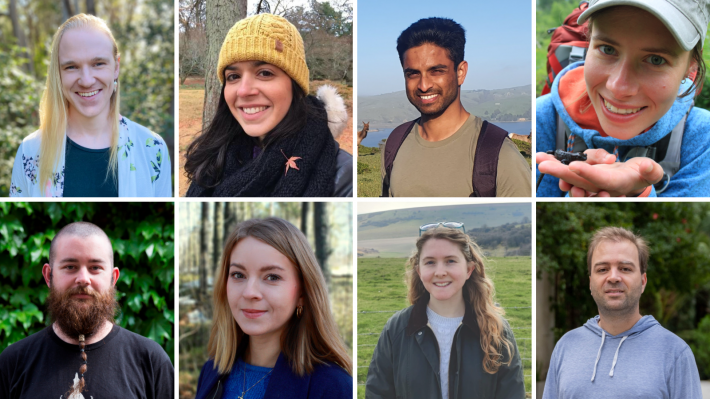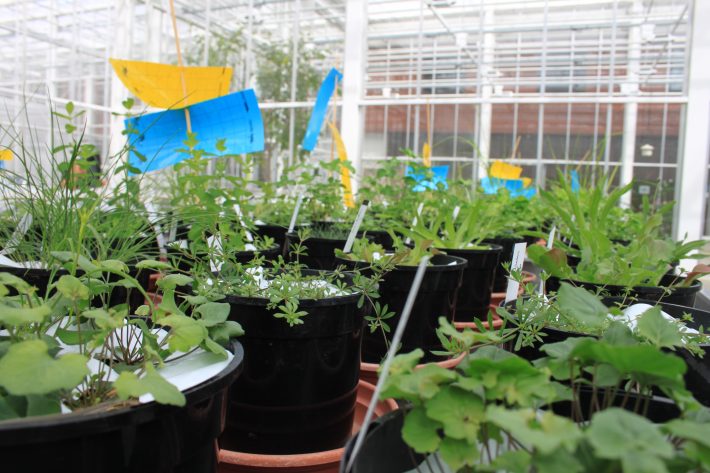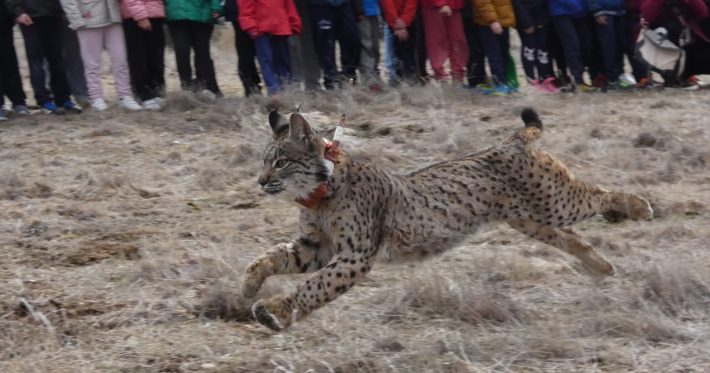British Ecological Society announces journal prize winners

Today the British Ecological Society (BES) has announced the winners of its journal prizes for research published in 2021. The prizes are awarded for the best paper by an early career researcher in seven of the BES journals: Functional Ecology, Journal of Animal Ecology, Journal of Applied Ecology, Journal of Ecology, Methods in Ecology and Evolution, People and Nature, and Ecological Solutions and Evidence.
The winning papers are selected by the Senior Editors of the journals and the awards will be presented to the winners at the BES Annual Meeting in Edinburgh.
The winners receive a prize of £250, membership of the BES, a year’s subscription to the respective journal, and free attendance to the BES Annual Meeting to present their work and receive their award from the President of the BES.
This year’s exceptional winning papers span topics as diverse as disease preventing hyenas, public perceptions of the deep sea, and valuing biocrusts.
The journal prize winners are as follows:
- The Functional Ecology Haldane Prize – Max Mallen-Cooper
- The Journal of Animal Ecology Elton Prize – Kate P. Maia
- The Journal of Applied Ecology Southwood Prize – Chinmay Sonawane
- The Journal of Ecology Harper Prize – Dina in ‘T Zandt
- The Methods in Ecology and Evolution Robert May prize – David Wilkinson
- The People and Nature Rachel Carson Prize – Laura Kaikkonen
- The Ecological Solutions and Evidence Georgina Mace Prize – Sara Bronwen Hunter
- The Ecological Solutions and Evidence Chico Mendes Prize Prize – Alexandro Leverkus
The Haldane Prize: Max Mallen-Cooper
University of New South Wales
The Functional Ecology Haldane Early Career Researcher Award is given is given each year to the best paper in the journal from an early career author. The winner is selected by the Senior Editors of the journal.
Max Mallen-Cooper, from the University of New South Wales, has been awarded this year’s prize for their article: Tissue chemistry of biocrust species along an aridity gradient and comparison to vascular plant leaves
I feel incredibly honoured to have won the prize, and it has given me a new sense of confidence in my writing
In the study, Max and co-author Will Cornwell, both at the University of New South Wales, compared the nutrient cycling potential of vascular plants and biocrusts (which are regularly excluded from ecosystem models). Biocrusts are extensive autotrophic groundcover which can be made up of different types of organisms such as lichens, mosses and liverworts.
“Most of the organisms forming biocrusts (lichens, bryophytes and cyanobacteria) photosynthesise like their larger vascular plant cousins, and several are able to fix nitrogen.” Explained Max. “People might not appreciate the vast extent of biocrusts in drylands. In these areas, which occupy almost half the world’s land area, biocrusts can completely cover the soil surface.
“From our comparison we found that biocrusts were chemically equivalent to leaves, and so could be considered an extra layer of leaves stretched across the soil surface. But within biocrust species, carbon content declined in increasingly dry environments. Given that many parts of the world are becoming drier due to climate change, this finding suggests that biocrusts in these areas will fix less and less carbon over time.”
On winning the Haldane prize, Max said: “I feel incredibly honoured to have won the prize, and it has given me a new sense of confidence in my writing. I also recognise my immense privilege in being a white third-generation scientist and will be donating the prize money to Deadly Science (deadlyscience.org.au), who provide science resources to remote schools around Australia.”
Katie Field, Senior Editor of Functional Ecology said: “The winner of this year’s Haldane Prize, Max Mallen-Cooper, investigated the often-overlooked contributions of biocrusts to ecosystem function. Remarkably, Max found that the tissue chemistries of the biocrust species and vascular plant leaves were similar, lending new support to the idea that, functionally, biocrusts can be effectively considered as a single layer of leaf covering the soil surface.
“This is an important step forward in our understanding and appreciation of the role of biocrust taxa in carbon and nutrient cycling and storage, giving new insight into a historically over-looked component of ecosystem function.”
The Elton Prize: Kate P. Maia
University of Bristol, University of Sao Paulo
The Elton Prize is awarded each year for the best paper in the Journal of Animal Ecology written by an early career author at the start of their research career. The winner is selected by the Senior Editors of the journal.
Kate P. Maia, from the University of Bristol and the University of Sao Paulo has been awarded this year’s prize for their article Interaction generalisation and demographic feedbacks drive the resilience of plant–insect networks to extinctions
In their study, Kate and colleagues used computer simulations to investigate how resistant plant-pollinator and plant-herbivore networks are to the loss of species. They found that when network structure was static, pollination networks were less resilient than herbivory networks. But when interaction rewiring was incorporated in the models, they showed that the structure of pollination networks enhanced resilience to extinctions.
Kate said: “I enjoyed the coding challenge of this research – since this was my first experience with this level of modelling – and to design the different scenarios for each of the questions.”
Darren Evans, Senior Editor of the Journal of Animal Ecology said: “Kate P. Maia and colleagues have created a general benchmark for the effect of network structure on robustness, which will undoubtedly help ecologists working on the resilience of different interaction networks.
“We were particularly impressed by the way Kate complemented her analysis of empirical network data with theoretical networks, elegantly advancing the utility of adaptive network models to help elucidate important ecological and evolutionary considerations pertinent to further studies of resilience.”
The Southwood Prize: Chinmay Sonawane
Harvard University
The Southwood Prize is awarded each year for the best paper in the Journal of Applied Ecology written by an early career author at the start of their research career. The winner is selected by the Senior Editors of the journal.
Chinmay Sonawane from Harvard University has been awarded this year’s prize for their article: Public health and economic benefits of spotted hyenas Crocuta crocuta in a peri-urban system
Working with the people and wildlife of Ethiopia was absolutely rewarding.
In the study Chinmay and co-authors looked at why spotted hyena presence has been tolerated in urban areas of East Africa for last 500 years. By observing the hyena population size in Mekelle, Ethiopia, Chinmay and colleagues estimated that these hyenas annually consume 207 tonnes of livestock carcass waste.
When they combined this data with disease transmission models, they found that hyena scavenging in Mekelle prevented 145 anthrax and bovine TB infections in humans and livestock and saves over USD 50,000 in treatment and livestock loss costs each year.
Chinmay said: “Due to the substantial sanitation and disease control services of Hyenas, local people tolerate their presence in their communities. We also argue that these public health and economic benefits of hyenas contribute to achieving three of the UN’s Sustainable Development Goals: ensuring good health and wellbeing, providing clean water and sanitation, and promoting terrestrial biodiversity.”
“Working with the people and wildlife of Ethiopia was absolutely rewarding.” Said Chinmay. I’d usually arrive at the landfill around sunset, just when the people working there began to leave. Many of these people were kids, who would eagerly but cautiously watch me pick up carrion, weigh it and then lay it out in an open area. With time, the kids progressively became bolder, and even approached to generously help me a handful of times.”
The Harper Prize: Dina in ‘T Zandt
Radboud University (currently at Czech Academy of Sciences and hosted at Teagasc, Republic of Ireland)
The John L Harper Early Career Researcher Award is given each year to the best paper in the Journal of Ecology by an early career author at the start of their career. The winner is selected by the Senior Editors of the journal.
Dina in ‘T Zandt from the Czech Academy of Sciences, who conducted the research at Radboud University, and his currently hosted at Teagasc, has been awarded this year’s prize for their article: Species abundance fluctuations over 31 years are associated with plant–soil feedback in a species-rich mountain meadow

In the study Dina and co-authors combined a 31-year plant abundance dataset with a greenhouse experiment to test whether dominant plant species are prevented from outcompeting less-dominant species because they accumulate negative soil effects, which result from things like an accumulation of soil-born plant pathogens.
They found that on average, the most abundant plant species were also the species that showed the strongest negative own soil effects, and that, over time, significant cyclic relations occurred between species fluctuations in abundance and negative soil effects.
Dina in ‘T Zandt said: “Our findings present a novel balance between a plant species’ success (competitive ability) and its limitations (own soil effects), which we propose to be driven by soil nutrient availability (years in which manuring occurred). The paper stands out due to the exceptionally long time series it covers, the cyclicity it uncovered and the presented conceptual framework to reconcile the complexity of the findings.”
Dina added: “In this study I particularly enjoyed the practical work in the greenhouse. It certainly was a lot of work, but I was lucky to have a dedicated MSc student and many technicians by my side. It really was a lot of fun to work together with so many enthusiastic people, day in day out listen to 90s music, and order pizza and beer to celebrate planting and harvesting days.”
David Gibson, Senior Editor of the Journal of Ecology said: “Dina’s study is an excellent example of how to match field and experimental greenhouse studies to investigate the role of plant-soil interactions in plant community assembly processes. The results of Dina’s study help explain contrasting results of plant-soil feedbacks reported in the literature, reflecting the dynamic nature of plant communities.”
The Robert May Prize: David Wilkinson
University of Melbourne
The Methods in Ecology and Evolution Robert May prize is awarded annually to the best paper submitted by an early career author at the start of their research career. The winner is selected by the Senior Editors of the journal.
David Wilkinson from the University of Melbourne has been awarded this year’s prize for their article: Defining and evaluating predictions of joint species distribution models
It felt like trying to untangle the Gordian Knot at times, but the skill set that I gained from it has been invaluable
In the winning article, David and colleagues provide a practical guide to assessing and quantifying the performance of joint distribution models. Joint distribution models are growing in popularity as a promising framework in ecology to account for species interactions and boosting the likelihood of successful wildlife management decisions.
David said: “I enjoyed the challenge of needing to simultaneously upgrade my statistical and R programming skills while learning how to use supercomputers from near scratch. It felt like trying to untangle the Gordian Knot at times, but the skill set that I gained from it has been invaluable to my career so far.”
Nicolas Lecomte, Senior Editor of the journal said: “Using a mixture of theory, empirical examples, and easy to run and replicate scripts, David and his team provided solid guidance for ecologists starting or already using joint distribution models.”
The Rachel Carson Prize: Laura Kaikkonen
University of Helsinki
The Rachel Carson Prize is awarded each year for the best paper in the journal People and Nature written by an early career author at the start of their research career. The winner is selected by the Senior Editors of the journal.
Laura Kaikkonen, from the University of Helsinki, has been awarded this year’s Rachel Carson Prize for their article We may not know much about the deep sea, but do we care about mining it?
Laura’s article examines the extent to which people care about the impacts of human activities in remote locations. Laura and co-author Ingrid van Putten conducted an online survey on the dimensions of environmental care for the deep sea in relation to perceived risks from deep-sea mining. These responses were compared to other participants feelings on other remote environments: Antarctica, the Moon, and remote terrestrial environments.
The study found that despite people having low knowledge of the deep sea, they did care about mining activities harming deep-sea ecosystems. Laura and Ingrid also found that people’s underlying values and emotions towards an environment, more so than their knowledge of it, shape people’s environmental care.
Laura said: “These findings refute the idea that because the deep sea is perceived as dark and scary (as often portrayed in popular culture), people would not care about it. The results of our study suggest that it is fundamental to both increase knowledge of the deep sea, and to account for the underlying values and emotions towards the ocean to understand how those risks will be perceived in the face of increasing human activities in the deep sea.”
Laura added: “As a natural scientist, exploring the concepts of affect, values, and symbolic meanings we associate with nature was incredibly rewarding and broadened my thinking about things that drive the way we treat the environment. This research allowed me to reflect on my own relationship with the ocean and why I care so deeply about the sea.”
Rosie Hails, Lead Editor of People and Nature, said: “This paper sets to tease apart the role of emotions and knowledge in connecting people with remote environments like the deep sea, and in doing so addresses an important knowledge gap. The concept is a simple one, the analysis and discussion thoughtful. This will add to a broader debate around biodiversity literacy.”
The Georgina Mace Prize: Sara Bronwen Hunter
University of Sussex (research conducted at Imperial College London)
The Georgina Mace Prize is awarded each year for the best paper in the journal Ecological Solutions and Evidence written by an early career author at the start of their research career. The winner is selected by the Senior Editors of the journal.
Sara Bronwen Hunter from the University of Sussex, who conducted the research at Imperial College London, has been awarded this year’s Georgina Mace Prize for their article Evidence shortfalls in the recommendations and guidance underpinning ecological mitigation for infrastructure developments
This study is unique because it really digs into the weight of evidence used to support the ecological mitigation and compensation measures
In the winning article, Bronwen and colleagues evaluated the weight of evidence supporting the ecological mitigation and compensation (EMC) measures used during infrastructure development to minimise its effect on protected species in the UK. The team identified 65 different mitigation measures across 50 housing applications and discovered that over half of the identified measures had not been empirically evaluated.
Bronwen said: “We hope that by highlighting the need for improved evidence-use our article will contribute to a more evidence-based approach in development mitigation. Further, it can provide key justification for future studies of the outcomes of mitigation.”
Holly Jones, Lead Editor of Ecological Solutions and Evidence, said: “This study is unique because it really digs into the weight of evidence used to support the ecological mitigation and compensation (EMC) measures that are used to mitigate the impacts of development and infrastructure on species with legal protection in the UK and EU. It’s critical that EMC measures protect species as habitat loss is the biggest cause of species endangerment globally.”
The Chico Mendes Prize: Alexandro Leverkus
University of Granada
The Chico Mendes Prize is awarded biennially to the best Practice Insights article by an early career practitioner in the journal Ecological Solutions and Evidence. The winner is selected by the Senior Editors of the journal.
Alexandro Leverkus from the University of Granada has been awarded this year’s Chico Mendes Prize for their article Enabling conditions for the implementation and conservation outcomes of a private nature reserve

In the winning article, Alexandro and colleagues examined the combination of economic, ethical, biophysical, socio-cultural and governance factors that led to the successful establishment and management of a private nature reserve in central Spain. The article not only highlights how conservation-orientated management of private lands can be incentivised, but also how hurdles can disincentivise such actions.
Alexandro said: “In our study we describe an inspiring case of conservation on private land in central Spain. A local philanthropist acquired a degraded estate, devoted it to restoration and conservation, and turned it into the Chico Mendes-Los Barranquillos private reserve. Through this research I enjoyed realising that motivated individuals do exist who are committed enough to conduct conservation at their personal cost and for the greater good.”
Marc Cadotte, Editor-in-Chief of Ecological Solutions and Evidence said: “Understanding the factors that drive conservation management on private lands is critical for creating and supporting incentives that lead to better conservation outcomes. Alexandro Leverkus’ winning article, concludes that government agencies can foster private land conservation by reducing bureaucratic barriers and providing technical and financial incentives.”
Like what we stand for?
Support our mission and help develop the next generation of ecologists by donating to the British Ecological Society.